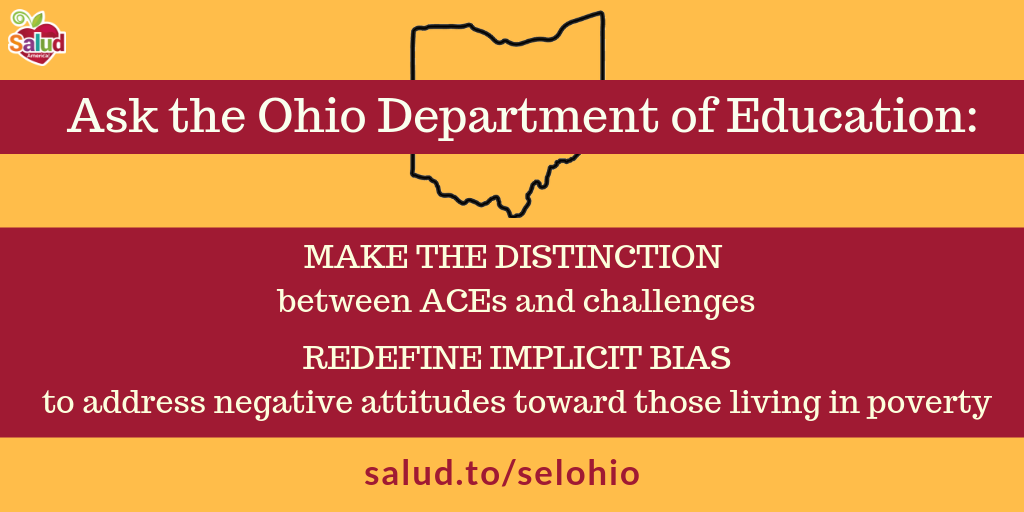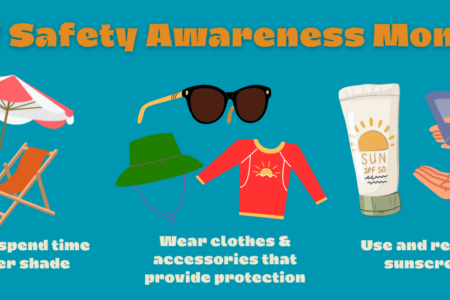
Share On Social!
The Ohio Department of Education wants your comment on its plans to expand Social and Emotional Learning standards in schools from kindergarten through 12th grade.
This is a big deal because Ohio would join only eight states with K-12 social and emotional learning standards, which help students gain life skills, such as emotional awareness, respect for each other, strong relationships, and responsible decision-making.
But we think Ohio’s standards can get even better.
The standards do not clearly define support for children who deal with adverse childhood experiences (ACEs). The standards also need a stronger application of implicit bias—people’s unconscious prejudice—to better support racial/ethnic students and those in poverty.
If you agree, email the following model comment to Ohio leaders by March 11.
 Greetings Ohio Department of Education,
Greetings Ohio Department of Education,
Thank you for working to develop social and emotional learning standards for kindergarten through grade 12. We applaud your commitment to students!
I urge you to further define and strengthen two areas: adverse childhood experiences and implicit bias.
- There is an important distinction between adverse childhood experiences (ACEs), like domestic violence, and “challenges and setbacks,” like losing a basketball game. Without protective factors, ACEs can permanently change a child’s brain, body, and behavior. Promoting resiliency and building protective factors to help children overcome adverse experiences is far different than promoting perseverance through a difficult task, particularly for Latino Latino kids exposed to many traumas have higher risk of obesity, future health issues, anxiety, withdrawal, aggression, and substance use, according to a Salud America!Research Review (http://salud.to/latinochild). They also have lower language, literacy, and math skills, and attention in school. I believe unique language should be added to the social and emotional learning standards to prevent educators and school personnel from confusing recovery and healing with perseverance and toughness. In order to build self-awareness, self-management, and responsible decision-making, it is important to make the distinction between ACEs and challenges. Please consider adding and modifying glossary terms to reflect the difference. Also, please consider adding standards to reflect the difference and address recovery and healing separate from perseverance and toughness.
- Addressing potential prejudices and biases requires acknowledgement of the impact of bias toward those living in poverty and people with disabilities. System justification and increased racial and economic segregation have resulted in negative attitudes toward those living in poverty, decreased tolerance of Latino and other communities of color, and indifferences toward those who are suffering. Beyond race, age and sex, I believe the social and emotional learning standards and implementation guide need to also consider people living in poverty and people with disabilities. In order to build social awareness and relationship skills, it is important to include people living in poverty and people with disabilities in definitions of discrimination, diversity, implicit bias, and prejudice. Please consider modifying glossary terms—in standards and implementation guide—to include people living in poverty and people with disabilities. Also, please consider adding standards to improve social cohesion. For example, intergroup contact, peer modeling, and awareness-provoking interventions may improve tolerance and compassion toward out-groups and counteract the stereotypes that contribute to system justification.
Thank you!
Send this email to ohio leaders!
What Else Can You Do for Students?
If you are in Ohio:
- Take the Ohio Department of Education’s survey to provide your input on each standard.
- Email Linda McKean for more information.
If you’re not in Ohio:
- Urge your state to add social and emotional learning standards.
- Share Ohio’s action with your state department of education and ask them to develop similar social and emotional standards. Find contact information for your state department of education here.
- Check out our Action Pack to help you make your school trauma-sensitive!
Remember, if you’re in Ohio, send our model email now and share this opportunity for public input with other local educators, school counselors, and education personnel!
Explore More:
Healthy Families & SchoolsBy The Numbers
142
Percent
Expected rise in Latino cancer cases in coming years



